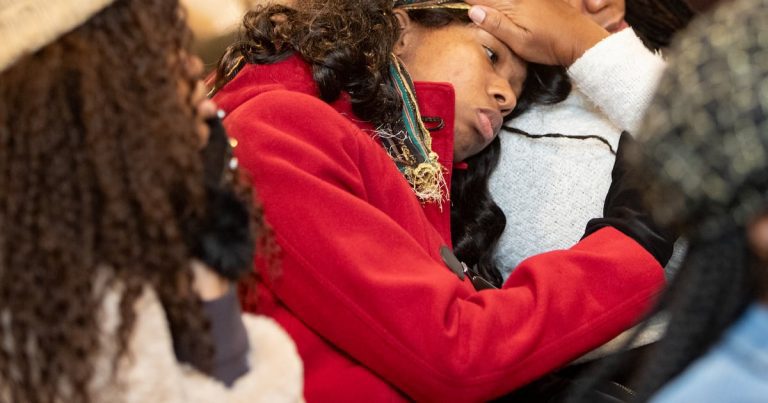The 33-year-old said her obstetrician gave her two additional ultrasounds and told her: “We don’t know what these chemicals are going to do to you and the baby, and we don’t know what the water will do. be like.'”
The boy’s due date is next Friday for his first child, a girl.
“Is the baby okay?” asked Boy in an interview after the meeting. “I just worry about the cancer, how it’s progressing. Will she reveal problems later? I’m afraid of the unknown.
According to the Georgia Department of Public Health, more than 1,000 people exposed to smoke from the BioLab fire sought medical care at hospital emergency rooms or urgent care facilities. Most of them were adults with mild symptoms such as cough, eye and nose irritation, sore throat and headache, a department spokesperson said.
However, many of the participants in Tuesday’s forum were deeply concerned about the lasting health consequences.
The panelists shared with the crowd of about 75 people what they had learned from other chemical disasters at businesses. Big tip: document everything.
“Write it down, take pictures, make videos,” said Tamara Freeze, of East Palestine, Ohio, the site of a catastrophic train derailment and major chemical incident involving Atlanta-based Norfolk Southern.
Freeze added: “I’m not just talking about your or your family’s symptoms, but there’s something on your roof or in the yard, or your tree looks like it’s dying, or you don’t see any frogs in your pond. We don’t see the birds flying.
Credit: Jenni Girtman
Credit: Jenni Girtman
Freeze spoke at the forum alongside Jami Wallace, president and founder of the East Palestine Train Derailment Unity Council and founder of the Chemically Impacted Communities Coalition, an international group of cities affected by chemical disasters in businesses.
Wallace and others told Rockdale residents that more research is needed on the health effects of exposure to several chemicals and called for a legislative change placing tighter restrictions on chemical manufacturers.
One panelist, Cheryl Garcia, apologized to the crowd for appearing hoarse. “Sorry,” she said, “that’s my BioLab voice, not my normal voice.”
Credit: Jenni Girtman
Credit: Jenni Girtman
Garcia, a retired nurse practitioner who lives seven miles from the BioLab facility, advised residents experiencing health problems to show their medical providers photos of the toxic plume coming from the fire, so they can take them. more seriously.
“Most health care providers have no idea the severity of what happened,” Garcia said. “They say, ‘Oh yeah, we saw a lot of people from Conyers after the BioLab fire,’ but until I showed them a picture of the plume, they went, oh my God.”
The United States Office of Chemical Safety and Hazard Investigation continues to investigate the cause of the BioLab fire.
Meanwhile, more than 40 plaintiffs seek class-action status for lawsuits against BioLab and its Lawrenceville-based parent company, KIK Consumer Products. The fire prompted the evacuation of more than 17,000 people and a lockdown warning throughout Rockdale County, which has a population of about 90,000.
Credit: John Spink
Credit: John Spink
Rockdale County brought a separate federal lawsuit against BioLab and related companies, alleging violations of the Clean Air Act, negligence and creation of a nuisance.
Biolab did not immediately respond Wednesday to a question about the risk of long-term health problems caused by the September fire. In a statement released Tuesday, the company said its top priorities are the health and safety of the communities in which it operates.
BioLab also said it has not resumed manufacturing operations and is cooperating with the Office of Chemical Safety’s investigation.





